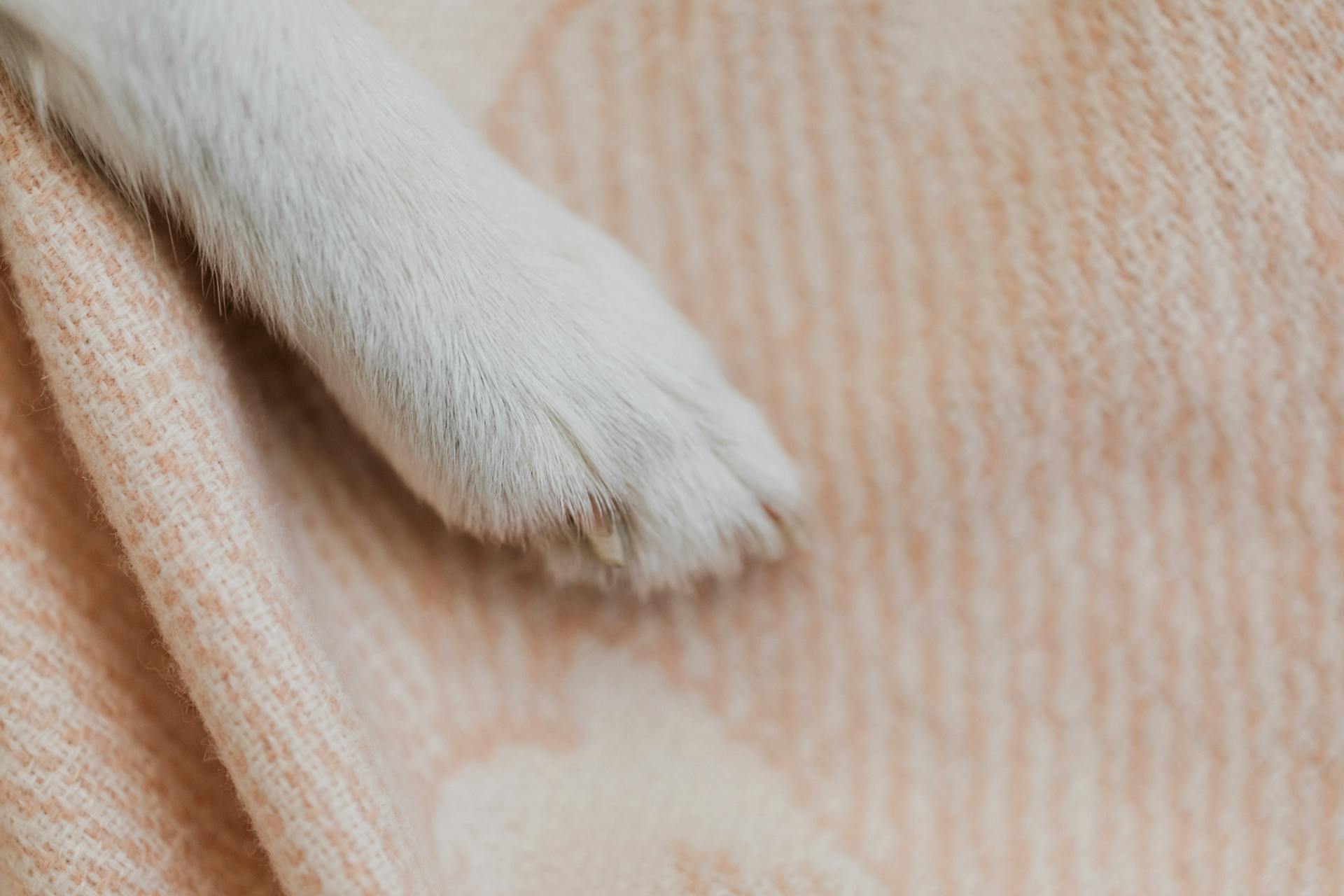
Shih Tzus are known to be prone to itchiness, and it's often due to their skin being sensitive. Their skin is thin and delicate, making it more susceptible to irritation.
One common cause of itchiness in Shih Tzus is allergies. Allergies can be caused by a variety of things, including food, environmental factors, and even fleas. Fleas are a common culprit, and it's estimated that up to 50% of Shih Tzus will develop flea allergies at some point in their lives.
Dry skin is another common issue in Shih Tzus. Their skin can become dry and flaky, especially during the winter months when the air is drier. This dryness can lead to itchiness and discomfort for your furry friend.
Regular grooming can help to prevent dry skin and itchiness, so be sure to brush your Shih Tzu regularly.
You might enjoy: Shih Tzu Skin Issues
What Causes Itching and Hair Loss?
It's not uncommon for Shih Tzus to experience itching and hair loss due to various dermatological afflictions.
Parasites like fleas, ticks, mange mites, or lice can cause skin irritation in dogs, leading to itching and hair loss.
Allergies to food, pollen, or other environmental irritants can also trigger these symptoms.
Bacterial or fungal infections can cause skin irritation, resulting in itching and hair loss.
Liver disease, which can cause bile salts to accumulate under the skin, is another possible cause of itching and hair loss in dogs.
Thyroid and adrenal gland dysfunction, including hypothyroidism or Cushing's disease, can also lead to itching and hair loss.
Here are some common signs of skin irritation in dogs:
- Scratching or chewing skin
- Licking paws
- Patches of bare skin
- Clumps of hair lying around the house
- Red, inflamed, or bleeding skin
- Skin odor
- Dry skin
Diagnosing the Issue
Your Shih Tzu's itchy skin is a clear sign that something is amiss, and the first step to relief is figuring out what's causing it.
Your vet will closely examine your dog's skin and ask for a history of the itchiness, including when it started. Several diagnostic tests can help determine the cause, including skin samples, blood tests, skin cultures, and allergy testing.
Readers also liked: Miniature Schnauzer Skin Problems
A physical examination will also be performed to look for evidence of parasites, skin lesions, and overall health.
Skin tests may be recommended if your dog is losing hair or scratching excessively, which could include skin scraping for mange, skin cytology for yeast and bacterial infections, fungal cultures for ringworm, or skin biopsies for skin cancer or other serious skin disease.
Common signs of a rash in dogs include redness, itchiness, red bumps, hair loss, scabs, sores, discharge, dry skin, scaly skin, and crusts.
Here are some common causes of a rash that your vet might suspect:
- Bee stings
- Allergies
- Parasites
- Bacterial and fungal infections
- Ringworm
If you spot any of these signs, it's essential to partner with your vet to figure out what's causing it and start treatment.
Treatment Options
So, you're wondering why your Shih Tzu is so itchy, and you're looking for some relief. Treatment for your dog's skin issues will depend on the cause and must be targeted to the specific organism or condition causing the skin inflammation.
Your veterinarian will prescribe appropriate medications to relieve itching and treat infections, if present. This might include medications to treat skin infections, such as antibiotics.
In some cases, the rash may go away on its own, but if not, veterinary treatments and home remedies are available. Your vet will recommend which treatment avenue to try, according to the rash's severity and cause.
Here are some examples of veterinary treatment for rashes:
- Medications to treat skin infections (e.g., antibiotics)
- Thyroid medication to manage hypothyroidism
- Prescription shampoos
- Medications that kill fleas, ticks, and mites
Your vet will help you determine the best course of treatment for your Shih Tzu's specific needs.
Common Causes of Rashes and Itching
Fleas can be a major culprit behind your Shih Tzu's itchy skin. Flea bites can create extremely itchy areas on your dog, and they can be found anywhere on the body, but are most common at the hind legs, tail base, and rear end.
Food allergies can also cause rashes and itching in dogs. Some dogs are allergic to common dog food ingredients such as beef, chicken, and dairy products. Food allergies in dogs can lead to changes to the skin around their paws, face, armpits, and belly.
If this caught your attention, see: Types of Dog Rashes on Belly
Environmental allergies can cause red and itchy skin in dogs, and can be caused by substances such as pollen, dust, and fertilizer. Dogs with environmental allergies will often have changes to the skin around their face, belly, and paws.
Here are some common causes of rashes and itching in dogs:
- Fleas
- Food allergies
- Environmental allergies
- Parasites (such as mites or ticks)
- Skin infections (such as pyoderma)
Insect Bites
Insect bites can be a common cause of rashes and itching in dogs. In fact, insect bites are as annoying for dogs as they are for people. They commonly occur on the belly and can cause a rash and itchiness. A spritz with some dog-friendly bug spray can help combat pesky bug bites in the warmer months.
Fleas, mites, and ticks are notorious for causing intense skin irritation, itching, and rashes. In particular, mites cause sarcoptic mange, which causes severe itching and rashes. Fleas can also cause a dog to have red, irritated, and itchy skin.
Here are some common signs of fleas in dogs:
- Skin sores and scabbing
- Flea dirt on the skin and places where your dog commonly rests (beds, couches, etc)
- Pale gums
- Hair loss
- Biting at the skin
- Restless behavior due to being uncomfortable
Even if fleas are not the cause, it's crucial to control them because fleas are likely to worsen existing skin problems.
Allergies
Allergies are a common cause of rashes and itching in dogs. They can be caused by a variety of environmental and food-related allergens.
Dogs can be allergic to common household items like pollen, dust, and fertilizer. These substances can irritate a dog's skin and cause a rash.
Food allergies are also a common cause of itching and rashes in dogs. Some dogs are allergic to common dog food ingredients like beef, chicken, and dairy products.
Here are some common signs that your dog's itchy and red skin is caused by a food or environmental allergy:
- Vomiting and diarrhea
- Hives
- Sneezing and discharge coming from the eyes
- Itching around the eyes, ears, and face
- Swelling around the eyes, ears, and mouth
- Excessive grooming (licking)
- Recurring ear infections
- Hair loss
- Hot spots
If you suspect that your dog has a food or environmental allergy, it's essential to consult with a veterinarian. They can perform diagnostic tests and recommend treatment options, such as immunotherapy, to help alleviate your dog's symptoms.
Curious to learn more? Check out: What Is a Shih Tzu
Prevention and Relief
Relieving your Shih Tzu's itchiness requires a multi-faceted approach. Regular bathing and grooming can greatly improve their condition, especially if they suffer from environmental allergies. Bathing once a week with soothing shampoos containing ingredients like oatmeal can help soften their skin and relieve itching.
Frequent bathing and grooming can also help remove dead skin and coat, promoting new growth and removing allergens on top of the skin and fur. Brushing and combing daily can make a big difference in reducing itching.
If your Shih Tzu's itchiness persists, schedule an appointment with your vet to discuss prescription treatment options. Prescription steroids may be effective in reducing itchiness, but they can cause side effects like increased urination, thirst, and weight gain.
How to Relieve
Relieving your dog's itchy skin is a top priority, especially during Itchy Pet Awareness Month in August. Shampoos containing colloidal oatmeal can reduce skin redness, dryness, and itching.
Using soothing ingredients like oatmeal in shampoos will help your dog's skin feel softer and relieve itching. Bathing once a week can greatly improve your dog's condition, depending on the severity of their allergies.
Aloe vera is a great home remedy for rashes, soothing the skin and helping it heal. You can apply aloe vera gel directly to the affected area to provide relief.
Over-the-counter shampoos and oils may only provide temporary relief, and the itch may come back because the root cause has not been addressed. Treatments like coconut oil and itch-relief shampoos are not a long-term solution.
Antihistamines are less helpful in relieving itch in dogs with environmental allergies, and may offer little to no benefit in treating environmental allergies in many dogs. Your vet may recommend prescription steroids, but they can cause side effects like increased urination, thirst, and weight gain.
Here's a quick rundown of temporary relief options:
To get your dog feeling better, schedule an appointment with your vet to discuss the most effective ways to relieve their itch. A prescription treatment from your vet may be needed to address skin allergies.
Feed a Wholesome Diet
Feeding your dog a wholesome diet can make a huge difference in their overall health and ability to fight off allergens. The more natural their diet, the better their bodies are able to heal from allergies and external stressors.
Consider reading: Shih Tzu Diet
Your dog's diet might be completely overlooked if they only suffer from environmental allergens. But, a natural diet can help their bodies fight off allergens more effectively.
Grain-free diets are highly recommended for dogs with any type of allergy. This is because they can help reduce the risk of allergic reactions.
If a grain-free diet isn't possible, consider feeding organic, whole grains. This can provide your dog with essential nutrients and fiber.
The better your dog's nutrition, the better their overall health and their ability to fight off allergens.
Sources
- https://www.thesprucepets.com/hair-loss-scratching-dogs-and-cats-3384665
- https://www.dailypaws.com/dogs-puppies/health-care/dog-conditions/dog-rashes
- https://www.animalhealthfoundation.org/blog/2017/04/6-natural-remedies-for-your-dogs-itchy-skin/
- https://vetmedcenterslc.com/blog/my-dogs-skin-is-red-and-itchy-what-do-i-do/
- https://www.akc.org/expert-advice/health/why-is-my-dog-so-itchy/
Featured Images: pexels.com


